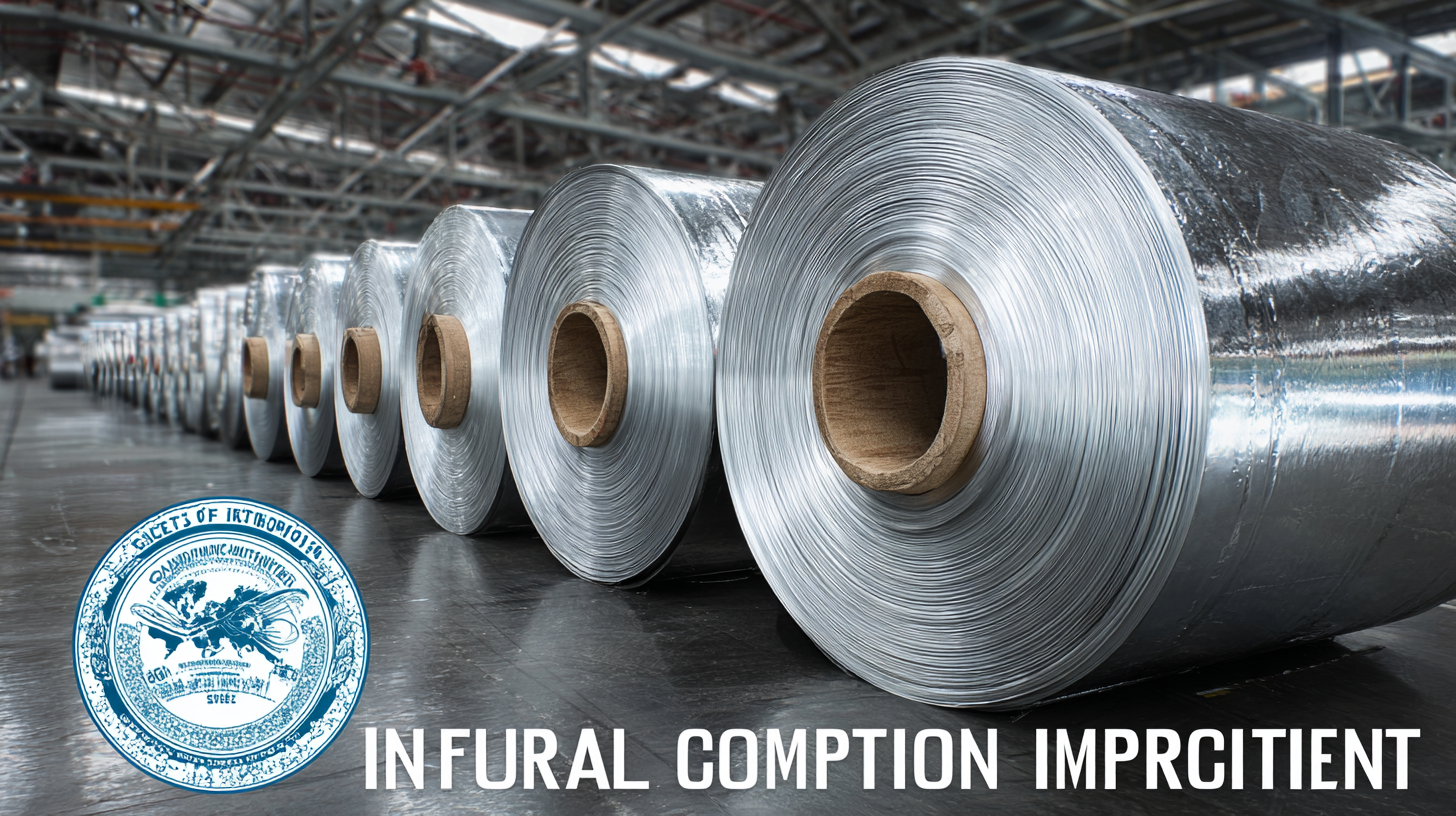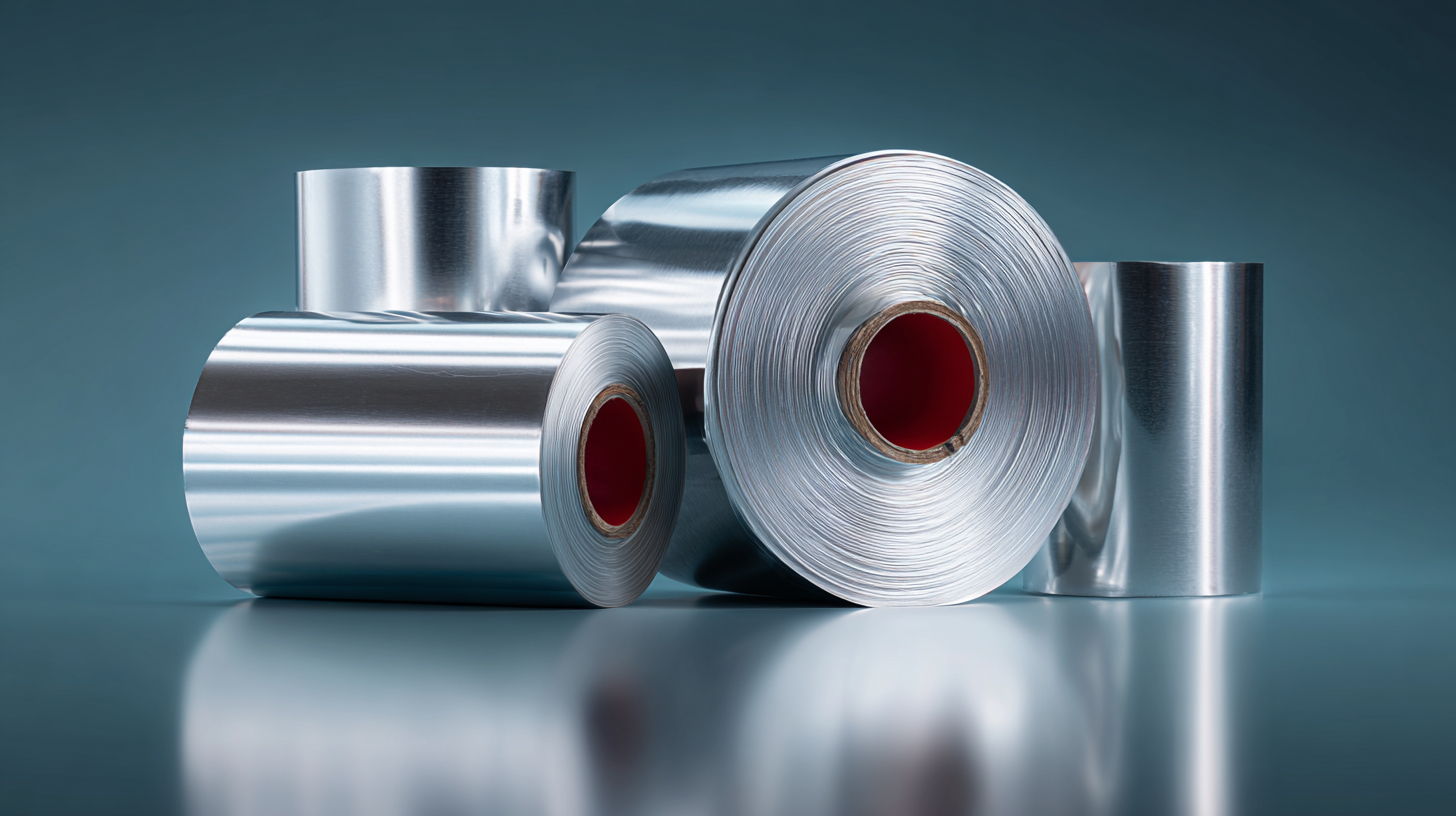Navigating Global Trade: The Importance of Import and Export Certifications for Best Aluminum Foil Sealing Film
In the rapidly evolving landscape of global trade, the significance of import and export certifications has become increasingly pronounced, particularly in industries such as packaging. The aluminum foil sealing film sector is a prime example, with the global market projected to surpass USD 5 billion by 2028, growing at a CAGR of over 5% from 2021 to 2028, according to a recent industry report. This growth can largely be attributed to the rising demand for lightweight and eco-friendly packaging solutions that aluminum foil sealing films provide. China, known for its manufacturing prowess, is now focusing on quality upgrades in this domain, as reflected in its exports which have surged by 15% annually over the past three years.

With stringent certification processes, manufacturers not only boost their credibility in the international arena but also meet the evolving standards of global consumers. As we delve into the intricacies of navigating global trade, understanding the critical role that import and export certifications play in the aluminum foil sealing film industry is essential for success.
Understanding Import and Export Certifications in the Aluminum Foil Sealing Film Market
In the competitive market of aluminum foil sealing films, understanding import and export certifications is crucial for businesses aiming to thrive globally. These certifications ensure that products meet specific regulatory standards set by various countries, which is vital given the rising demand for food packaging solutions. According to a report by Smithers Pira, the global market for aluminum foil packaging is expected to reach $31 billion by 2024, making compliance with certification requirements more important than ever for manufacturers and importers.
When navigating international trade, it's essential to stay updated on different countries' certification processes. For instance, the FDA imposes stringent regulations on food packaging materials, while the EU requires compliance with its REACH regulations. Failure to secure these certifications can lead to costly delays and restrictions in market access.
**Tips:** Ensure that all product specifications are documented and available for inspection, as this can expedite the certification process. Additionally, consider engaging with a consultant who specializes in import-export regulations to help navigate the complexities of various certification systems effectively. Keeping abreast of regional compliance updates can also prevent disruptions in your supply chain.
Navigating Global Trade: The Importance of Import and Export Certifications for Best Aluminum Foil Sealing Film
| Country |
Certification Type |
Authority |
Validity Period |
Key Requirements |
| USA |
FDA Approval |
Food and Drug Administration |
3 years |
Safety standards, labeling |
| European Union |
CE Marking |
European Commission |
5 years |
Health, safety, environment |
| China |
GB Standards |
Standardization Administration of China |
No expiration |
Quality, performance |
| Japan |
JIS Certification |
Japanese Industrial Standards Committee |
3 years |
Industrial performance |
| India |
BIS Certification |
Bureau of Indian Standards |
5 years |
Quality, safety |
The Role of Quality Standards in Global Trade of Aluminum Foil Products
In the competitive landscape of global trade, the significance of stringent quality standards cannot be overstated, especially in the aluminum foil industry. The reliability of aluminum foil products hinges on adherence to import and export certifications, which serve as a testament to the quality and safety of these goods. Companies engaged in manufacturing and distributing aluminum foil sealing film must prioritize these certifications to not only meet regulatory requirements but also to enhance their reputations in international markets.

As the aluminum foil packaging market is projected to grow significantly in the coming years, the role of quality standards becomes even more critical. Manufacturers that align their production processes with internationally recognized standards are better positioned to gain consumer trust and market share. This adherence ensures that products not only meet the expectations of quality and performance but also comply with environmental and safety regulations, which are increasingly important to customers worldwide. As businesses navigate the complexities of global trade, embracing quality standards through certifications will ultimately foster long-lasting partnerships and contribute to sustainable growth in the aluminum foil sector.
Impact of Regulatory Compliance on International Trade Efficiency
In the realm of international trade, regulatory compliance plays a pivotal role in enhancing efficiency. Import and export certifications are not merely procedural elements; they are crucial components that determine the success of trade operations. According to a report by the International Trade Centre, approximately 30% of small and medium-sized enterprises (SMEs) face significant challenges related to regulatory compliance when entering foreign markets. This statistic highlights the pressing need for businesses to navigate complex certification processes to mitigate delays and avoid costly penalties.
Furthermore, compliance with international standards can significantly impact the trade dynamics of sectors like aluminum foil sealing films, where product quality and safety are paramount. The Global Trade Management Report states that achieving certification can lead to a 20% increase in market access for exporters. Companies that ensure their aluminum foil products meet recognized certifications not only improve their credibility but also facilitate smoother customs clearance and faster delivery times, directly influencing overall profitability. Therefore, regulatory compliance is not just about adhering to rules; it is a strategic advantage that can propel companies forward in the competitive landscape of global trade.
Navigating Global Trade: The Importance of Import and Export Certifications for Aluminum Foil Sealing Film
This chart illustrates the number of import and export certifications issued for different certification types relevant to aluminum foil sealing film. Regulatory compliance plays a crucial role in ensuring international trade efficiency, impacting the production and distribution processes across borders.
Analyzing Market Demand for Certified Aluminum Foil Sealing Films by Region
In the evolving landscape of global trade, the demand for certified aluminum foil sealing films is increasingly prominent across various regions. According to recent market analysis reports, the aluminum foil market is projected to witness significant growth from 2024 to 2034, driven by a burgeoning interest in sustainable and eco-friendly packaging solutions. This heightened demand is particularly evident in industries such as pharmaceuticals and food packaging, where product integrity and safety are paramount.
Regional analyses indicate that specific areas are showing stronger demand, with the Asia-Pacific region leading the way due to its expanding pharmaceutical sector. Furthermore, the Alu Alu Cold Blister Films Market is anticipated to see robust growth from 2025 to 2035, suggesting a projected increase in applications that require impermeable and protective packaging. The need for compliance with import and export certifications in these markets underscores the importance of sourcing high-quality aluminum foil sealing films that meet international standards. As businesses navigate global trade, ensuring that their products are certified not only enhances marketability but also guarantees adherence to safety and quality regulations.

Future Trends in Import and Export Certifications for Aluminum Packaging Materials
The aluminum packaging market is poised for significant growth, with the global recycled aluminum market projected to reach USD 148.10 billion by 2034, reflecting a compound annual growth rate (CAGR) of 4.43%. This growth underscores the increasing importance of advanced import and export certifications in ensuring the quality and sustainability of aluminum foil sealing films. As consumers demand more environmentally friendly packaging, manufacturers are under pressure to comply with stricter regulations and certification processes, which can facilitate smoother transitions in global trade.
In the face of evolving trade tariffs, such as the recent increases on imported steel and aluminum, understanding the implications of these regulations is crucial for businesses operating within the aluminum packaging sector. The recent shifts in tariffs have raised concerns over production costs, leading manufacturers to rethink their sourcing strategies. Companies that prioritize compliance with import/export certifications can not only mitigate risks associated with these tariffs but also tap into emerging market opportunities focused on sustainability initiatives. As market dynamics continue to evolve, staying ahead of certification trends will be vital for those engaged in the aluminum packaging industry.